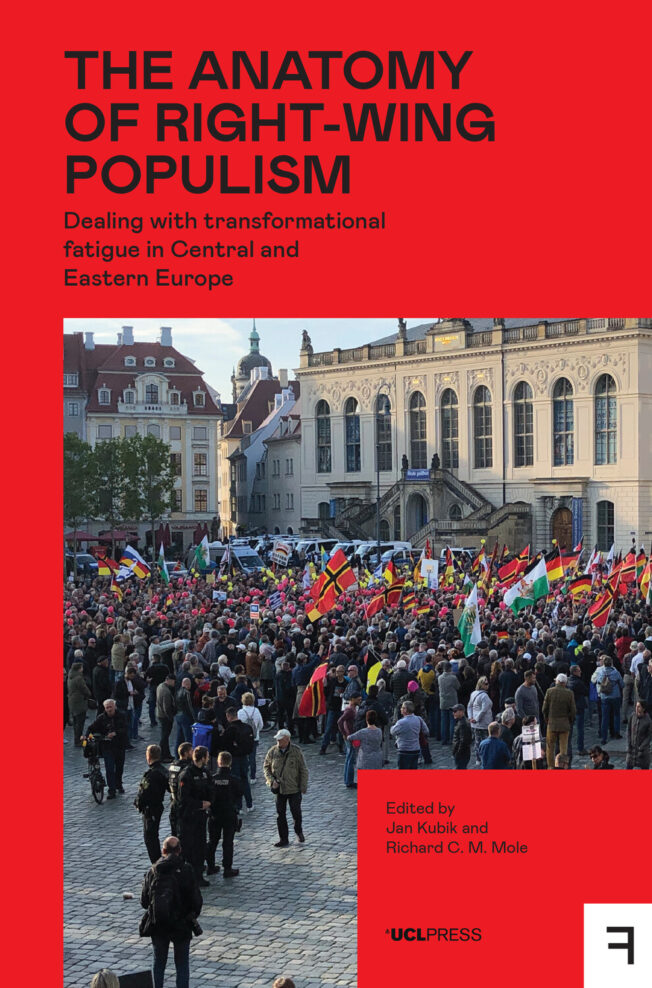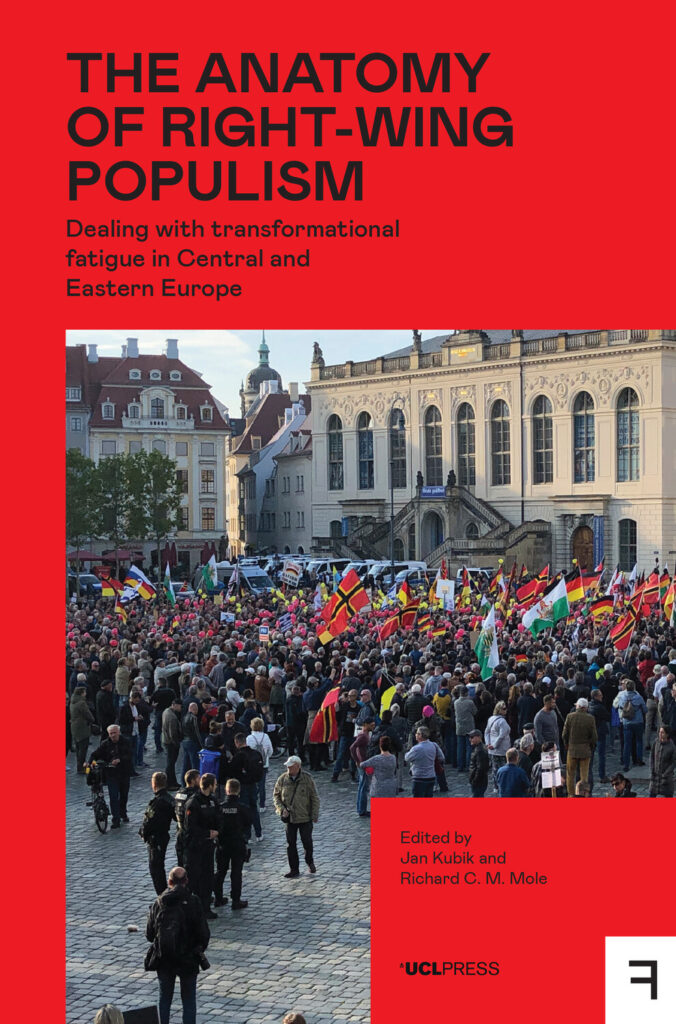
The Anatomy of Right-Wing Populism
Dealing with transformational fatigue in Central and Eastern Europe
Jan Kubik (Editor), Richard C. M. Mole (Editor)
Series: FRINGE
Over the past two decades, populist politicians and parties have enjoyed remarkable success across the globe. The rise of right-wing populism is perhaps most noticeable in post-communist Europe, especially in Hungary and Poland, where politicians subscribing to this ideology have come to power and weakened media pluralism, the protection of minorities, the sovereignty of civil society and the independence of the judiciary.
To develop a multidisciplinary understanding of the rise and functioning of right-wing populism in Central and Eastern Europe, The Anatomy of Right-wing Populism examines the two original concepts of neo-traditionalism (to capture the construction of the pure people in opposition to the corrupt elites and the threatening others) and neo-feudalism (to capture an economic strategy whereby a relatively small elite controls the apex of political power and a sizable portion of the country’s economy). This book argues that the causes and consequences of populism cannot be fully understood without a multidisciplinary analysis, drawing on the theories and approaches of politics, history, economics, sociology and anthropology. Grounded in empirical research, this volume provides theoretical insights into how populism became such a powerful political force and formulates policy recommendations on how to resist illiberalism, thereby appealing not only to academics but also to activists and policy makers.
List of figures
List of tables
List of contributors
Acknowledgements
1 Dealing with transformational fatigue in Central and Eastern Europe
Jan Kubik and Richard C. M. Mole
Part I: Illiberal democracy and right-wing politics
Foreword by Natasza Styczyńska
2 The illiberal and neo-traditionalist discursive shift in Poland
Francesco Melito
3 Representations of Russia in Georgian and Ukrainian far-right populist discourses
Michael Cole
Part II: The economics of populism
Foreword by István Benczes
4 Does twenty-first century economic populism exist?
Denis Ivanov
5 Trapped in the past? Examining the difference in individual preferences for governments’ policies to address income inequality between CEE and the West
Paulina Lenik
6 The effect of policies of populist parties in power on economic performance: the case of Hungary
Elena Cossu
Part III: Networks of power and resistance
Foreword by Jan Kubik
7 A diachronic social network analysis of the impact of the populist party system on civil society and the media in Hungary, 1990–2020
Máté Mátyás
8 Conflict zone gender: pillarised society in Poland and the rise of illiberalism
Carolin Heilig
9 Contemporary feminist movements in Central and Eastern Europe: Transnational mobilising against anti-gender alliances
Mina Baginova
Part IV: Populist discourse and the politics of othering
Foreword by Richard C. M. Mole
10 Antisemitism in Serbia and Croatia: a study of antisemitic hate speech on 4chan’s ‘politically incorrect’ board
Tiril Ellingsen Thue
11 A qualitative approach to Islamophobia in Czech public opinion: historical changes, the limits of ‘Muslims’ as a topic, racialisation and understandings of ‘Islam’
Carlos Gómez del Tronco
12 Between right-wing populist discourse and liberal policy: the curious case of Ukrainian migration to Poland
Olena Yermakova
13 Advocating same-sex and ‘natural’ families in Serbia, Bosnia and Herzegovina and Croatia
Slobodanka Dekić
Part V: Neo-traditionalism and the politics of memory
Foreword by Kateřina Králová
14 Resisting ‘leftist dictatorship’? Populism and memory in far-right street politics in Dresden
Sabine Volk
15 Politics of memory in Orbán’s Hungary: the case of the centenary of the Treaty of Trianon in 2020
Andrzej Sadecki
16 Fidesz’s neo-traditionalist pull factors: the Transylvanian Hungarian minority
Ionut-Valentin Chiruta
17 Remedies: going beyond the restoration of the rule of law
Jan Kubik and Richard C. M. Mole
Index
DOI: 10.14324/111.9781800086777
Publication date: 14 October 2025
PDF ISBN: 9781800086777
EPUB ISBN: 9781800086807
Hardback ISBN: 9781800086791
Paperback ISBN: 9781800086784
Jan Kubik (Editor) 
Jan Kubik is Distinguished Professor in the Department of Political Science, Rutgers University and Professor Emeritus at the UCL School of Slavonic and East European Studies.
Richard C. M. Mole (Editor) 
Richard C. M. Mole is Professor of Political Sociology at the UCL School of Slavonic and East European Studies.
Related titles
The Anatomy of Right-Wing Populism
Dealing with transformational fatigue in Central and Eastern Europe
Over the past two decades, populist politicians and parties have enjoyed remarkable success across the globe. The rise of right-wing populism is perhaps most noticeable in post-communist Europe, especially in Hungary and Poland, where politicians subscribing to this ideology have come to power and weakened media pluralism, the protection of minorities, the sovereignty of civil society and the independence of the judiciary.
To develop a multidisciplinary understanding of the rise and functioning of right-wing populism in Central and Eastern Europe, The Anatomy of Right-wing Populism examines the two original concepts of neo-traditionalism (to capture the construction of the pure people in opposition to the corrupt elites and the threatening others) and neo-feudalism (to capture an economic strategy whereby a relatively small elite controls the apex of political power and a sizable portion of the country’s economy). This book argues that the causes and consequences of populism cannot be fully understood without a multidisciplinary analysis, drawing on the theories and approaches of politics, history, economics, sociology and anthropology. Grounded in empirical research, this volume provides theoretical insights into how populism became such a powerful political force and formulates policy recommendations on how to resist illiberalism, thereby appealing not only to academics but also to activists and policy makers.

